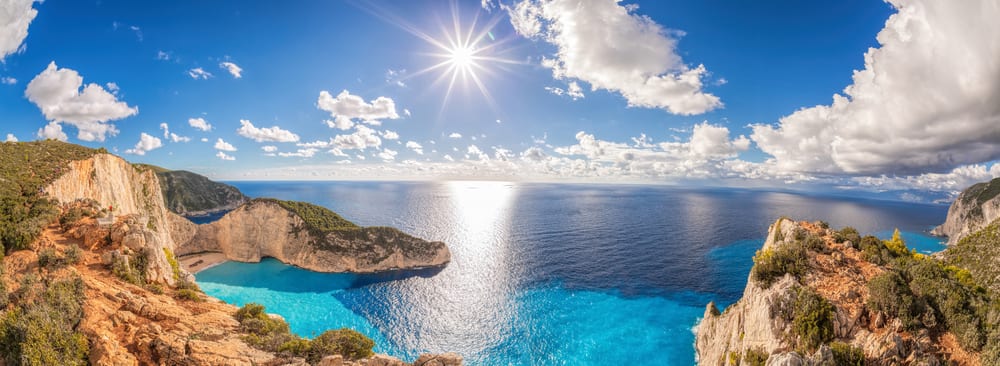Guaranteed sunshine in every novel…
Guaranteed sunshine in every novel…
Guaranteed sunshine in every novel…
-
Hannah
-
Hannah


I have returned from France to my home in Ireland, and the views of rich-green lawns and spun-gold leaves and skeletal branches reaching up to dreamy clouds are beautiful. And yet, I must confess, I miss the sunshine.
‘Keep your face to the sun and you will never see the shadows,’ wrote author and activist Helen Keller, and this is a philosophy I live by, both metaphorically and, where possible, practically.
Spending summers at my French home affords me the opportunity to drink in the sunshine, and I do so eagerly each day, laying down reserves for the long winter months. The sun inspires and soothes; it lifts the mood; it energises and heals. ‘Ópou o í̱lios baínei o giatrós den títhetai,’ I write in my new novel, Aphrodite’s Tears, quoting a Greek proverb: ‘Where the sun enters, the physician does not.’
Aphrodite’s Tears, my upcoming novel, will transport readers to the beautiful island of Helios in the Ionian Sea. Perhaps ‘Helios’ sounds familiar to you, if you know something of Greek mythology. I could not resist naming my fictional Greek island where the sun shines so brightly after the Greek god of the sun. According to legend, each day Helios rides his chariot of the sun across the sky, drawn by his fiery steeds, Pyrois, Aeos, Aethon, and Phlegon.
I also touch upon sun mythology in my debut novel, Burning Embers. An old Kenyan lady tells this legend:
At the beginning of all things, the sun married the moon. They traveled together for a long time, and the sun would go in front with the moon following behind. As they traveled, the moon would sometimes get tired, so the sun would carry her. One day the moon forgot to stay behind the sun and passed in front of him. The sun became angry, so the moon was beaten by the sun in just the same way women are beaten by their husbands when they forget their place.
But the sun did not realize that he had married one of those women who fight their husbands. When the moon was beaten, she fought back, and wounded the sun on his forehead. The sun also fought, and scratched the moon’s face and plucked out one of her eyes. When the sun saw that he was scarred, he was very embarrassed and said to himself, ‘I am going to shine so brightly that people will not be able to look at me and see my scars.’ And so he shone so hard that people could not look at him without squinting. That is why the sun shines so brightly. As for the moon, she felt no embarrassment, and so she did not have to shine any brighter. And even now, if you look closely at the moon, you will see the marks on her face that the sun gave her during their fight.
The sun is a reoccurring theme in all of my novels. Beautiful settings lit by the sun inspire my characters and draw them outside, where they connect with the place and its culture and people. Take this extract, from The Echoes of Love:
Finally she slipped out of bed and ran to the window that overlooked the lagoon. As her apartment was on the third floor, the stretch of shoreline was visible for miles. The waters were very blue under the cloudless sky, sparkling in the sunshine; everything was clear in the crystal air, but it was still very cold. A heavenly morning, too beautiful to stay indoors!
The sun paints the canals of Venice a stunning blue and lights the water with sparkles, enticing Alexandra to go outside and explore.
Of course, sunshine is also conducive to romance and sensuality. The quality of the light and the warmth it creates can cause a heroine to mellow and relax, to let down her guard and carefully constructed boundaries. The sunshine can be heady, intoxicating even. Enticing. Sultry. Sensual.
In Masquerade, the heroine Luz sails to a little private cove, and after tiring herself out through swimming and snorkelling, she falls asleep while sunbathing on the beach. I write:
The sun was still blazing when she woke up, hot and clammy. Her bikini was sticking to her like a second skin and her hair was damp, unpleasant against her nape. She padded across the sun-warmed sand and stood digging her toes deep in the fine ivory-coloured strip, feasting her eyes on the crystal-clear waters lapping at her feet. Golden sunbeams danced on the glasslike surface; it was seductively inviting.
‘Seductively’: that is the effect the sun is having on Luz. When, minutes later, Leandro appears on the cliff and dives into the water to join her, she is swept away:
She clung to him; all thought and reason and past resolve evaporating, her skin fluttering beneath his touch, intoxicated by love, by desire and by the sun.
The sun: a powerful force indeed, the very centre of the universe and fundamental to inspiration and growth and happiness. It is no wonder we miss it so in winter. But I do not dwell on the months ahead when I will not be able to sit in the garden and feel the sunrays warming my face, for I have the means to escape to the sun every day: my fiction.
I do hope you’ll join me in Helios, Greece, when my new novel is released in January. I can guarantee you plenty of hours of brilliant, dazzling sunshine to chase away the winter shadows in Aphrodite’s Tears.